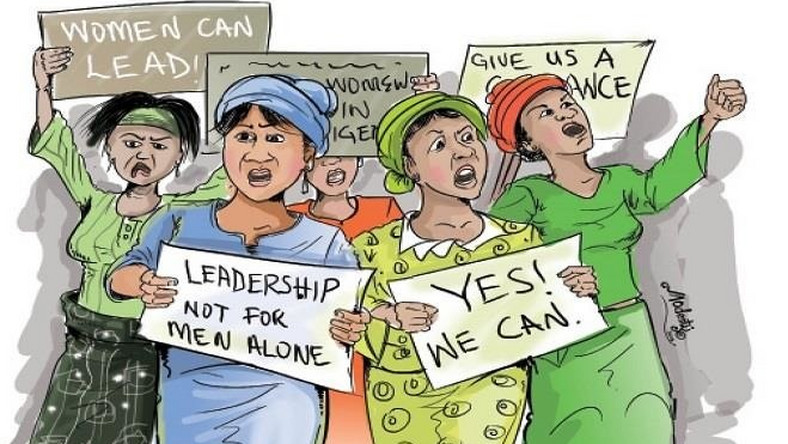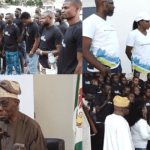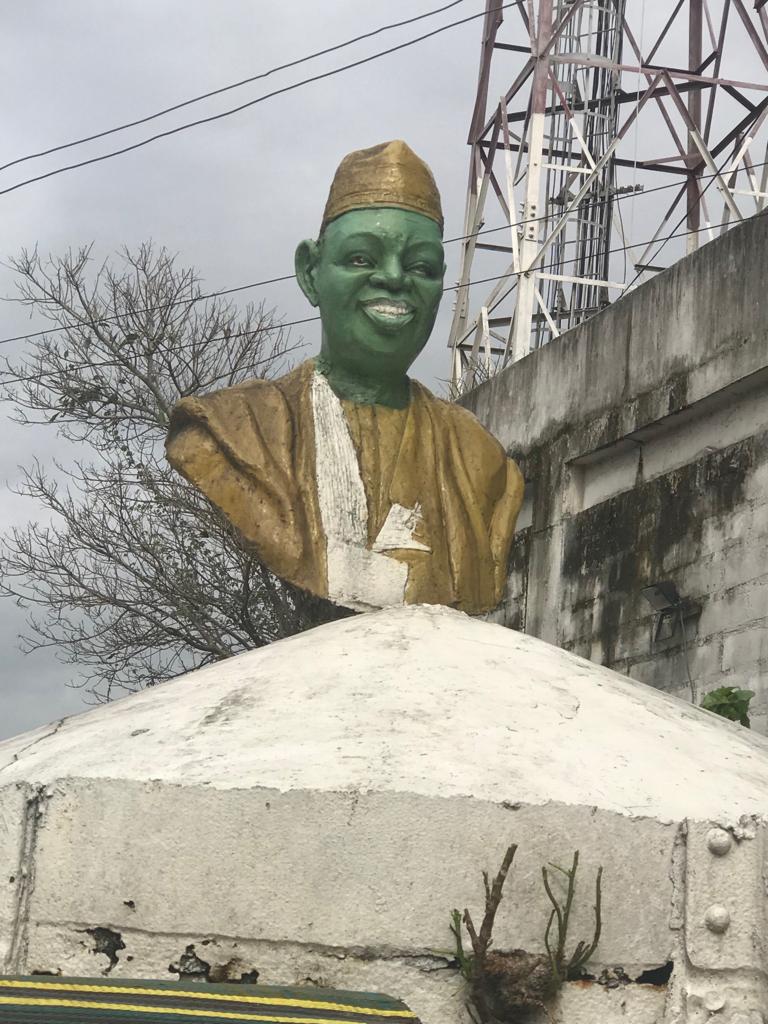 Women have been charged to avail themselves of opportunities to make themselves relevant in politics in order to bridge the gender parity gap in the country.
Women have been charged to avail themselves of opportunities to make themselves relevant in politics in order to bridge the gender parity gap in the country.
Hon. Nkeiruka Onyejeocha, one of the contenders for the position of Speaker of the house of representatives, gave this charge at a strategic meeting on women participation in governance and politics held in Abuja.
The dwindling number of women participating in politics and governance especially in the last general election in Nigeria has continued to raise concerns.
These concerns are the focus of this strategic meeting on ways to increase women’s effective participation in the electoral process and fulfil the United Nation’s sustainable development goal of gender equality.
Legislation is identified as urgently needed to ensure gender parity, as a gap in Nigeria’s constitution is making it more difficult for women to push for inclusion
Advocates of women’s participation in governance says this will strengthen the nations economy and ensure stability and security
The gender gap of women in politics in Nigeria is definitely widening, 20 years on in democracy Less than 10% of women are in elective positions, or in the decision making hierarchy of political parties
In 1999, there were 12 women in the house of representatives out of the 360 seats while the senate had just 3 seats out of 109, in 2003 House of representatives has 17 women while the senate had 3, in 2007, the House had 25 female lawmakers, while the senate had 9.
In 2011, the House of Representatives had 24 women while the senate had 7, while in 2015, had 20 women while the senate maintained 7 seats for women.
2019 election has so far remained the worst as far as women representation is concerned with the House recording just 11 in its ranks while the senate had 3 women senators.
According to the inter-parliamentary union ranking, Nigeria ranks 180, only ahead of 12 other countries while Rwanda takes the pride of Africa as the number 1 in the world with the highest participation of women
With such awareness and consciousness raised, government should do it’s part on according women their rightful place in governance.
 Women have been charged to avail themselves of opportunities to make themselves relevant in politics in order to bridge the gender parity gap in the country.
Women have been charged to avail themselves of opportunities to make themselves relevant in politics in order to bridge the gender parity gap in the country.
Hon. Nkeiruka Onyejeocha, one of the contenders for the position of Speaker of the house of representatives, gave this charge at a strategic meeting on women participation in governance and politics held in Abuja.
The dwindling number of women participating in politics and governance especially in the last general election in Nigeria has continued to raise concerns.
These concerns are the focus of this strategic meeting on ways to increase women’s effective participation in the electoral process and fulfil the United Nation’s sustainable development goal of gender equality.
Legislation is identified as urgently needed to ensure gender parity, as a gap in Nigeria’s constitution is making it more difficult for women to push for inclusion
Advocates of women’s participation in governance says this will strengthen the nations economy and ensure stability and security
The gender gap of women in politics in Nigeria is definitely widening, 20 years on in democracy Less than 10% of women are in elective positions, or in the decision making hierarchy of political parties
In 1999, there were 12 women in the house of representatives out of the 360 seats while the senate had just 3 seats out of 109, in 2003 House of representatives has 17 women while the senate had 3, in 2007, the House had 25 female lawmakers, while the senate had 9.
In 2011, the House of Representatives had 24 women while the senate had 7, while in 2015, had 20 women while the senate maintained 7 seats for women.
2019 election has so far remained the worst as far as women representation is concerned with the House recording just 11 in its ranks while the senate had 3 women senators.
According to the inter-parliamentary union ranking, Nigeria ranks 180, only ahead of 12 other countries while Rwanda takes the pride of Africa as the number 1 in the world with the highest participation of women
With such awareness and consciousness raised, government should do it’s part on according women their rightful place in governance.
 Women have been charged to avail themselves of opportunities to make themselves relevant in politics in order to bridge the gender parity gap in the country.
Women have been charged to avail themselves of opportunities to make themselves relevant in politics in order to bridge the gender parity gap in the country.
Hon. Nkeiruka Onyejeocha, one of the contenders for the position of Speaker of the house of representatives, gave this charge at a strategic meeting on women participation in governance and politics held in Abuja.
The dwindling number of women participating in politics and governance especially in the last general election in Nigeria has continued to raise concerns.
These concerns are the focus of this strategic meeting on ways to increase women’s effective participation in the electoral process and fulfil the United Nation’s sustainable development goal of gender equality.
Legislation is identified as urgently needed to ensure gender parity, as a gap in Nigeria’s constitution is making it more difficult for women to push for inclusion
Advocates of women’s participation in governance says this will strengthen the nations economy and ensure stability and security
The gender gap of women in politics in Nigeria is definitely widening, 20 years on in democracy Less than 10% of women are in elective positions, or in the decision making hierarchy of political parties
In 1999, there were 12 women in the house of representatives out of the 360 seats while the senate had just 3 seats out of 109, in 2003 House of representatives has 17 women while the senate had 3, in 2007, the House had 25 female lawmakers, while the senate had 9.
In 2011, the House of Representatives had 24 women while the senate had 7, while in 2015, had 20 women while the senate maintained 7 seats for women.
2019 election has so far remained the worst as far as women representation is concerned with the House recording just 11 in its ranks while the senate had 3 women senators.
According to the inter-parliamentary union ranking, Nigeria ranks 180, only ahead of 12 other countries while Rwanda takes the pride of Africa as the number 1 in the world with the highest participation of women
With such awareness and consciousness raised, government should do it’s part on according women their rightful place in governance.
 Women have been charged to avail themselves of opportunities to make themselves relevant in politics in order to bridge the gender parity gap in the country.
Women have been charged to avail themselves of opportunities to make themselves relevant in politics in order to bridge the gender parity gap in the country.
Hon. Nkeiruka Onyejeocha, one of the contenders for the position of Speaker of the house of representatives, gave this charge at a strategic meeting on women participation in governance and politics held in Abuja.
The dwindling number of women participating in politics and governance especially in the last general election in Nigeria has continued to raise concerns.
These concerns are the focus of this strategic meeting on ways to increase women’s effective participation in the electoral process and fulfil the United Nation’s sustainable development goal of gender equality.
Legislation is identified as urgently needed to ensure gender parity, as a gap in Nigeria’s constitution is making it more difficult for women to push for inclusion
Advocates of women’s participation in governance says this will strengthen the nations economy and ensure stability and security
The gender gap of women in politics in Nigeria is definitely widening, 20 years on in democracy Less than 10% of women are in elective positions, or in the decision making hierarchy of political parties
In 1999, there were 12 women in the house of representatives out of the 360 seats while the senate had just 3 seats out of 109, in 2003 House of representatives has 17 women while the senate had 3, in 2007, the House had 25 female lawmakers, while the senate had 9.
In 2011, the House of Representatives had 24 women while the senate had 7, while in 2015, had 20 women while the senate maintained 7 seats for women.
2019 election has so far remained the worst as far as women representation is concerned with the House recording just 11 in its ranks while the senate had 3 women senators.
According to the inter-parliamentary union ranking, Nigeria ranks 180, only ahead of 12 other countries while Rwanda takes the pride of Africa as the number 1 in the world with the highest participation of women
With such awareness and consciousness raised, government should do it’s part on according women their rightful place in governance.
 Women have been charged to avail themselves of opportunities to make themselves relevant in politics in order to bridge the gender parity gap in the country.
Women have been charged to avail themselves of opportunities to make themselves relevant in politics in order to bridge the gender parity gap in the country.
Hon. Nkeiruka Onyejeocha, one of the contenders for the position of Speaker of the house of representatives, gave this charge at a strategic meeting on women participation in governance and politics held in Abuja.
The dwindling number of women participating in politics and governance especially in the last general election in Nigeria has continued to raise concerns.
These concerns are the focus of this strategic meeting on ways to increase women’s effective participation in the electoral process and fulfil the United Nation’s sustainable development goal of gender equality.
Legislation is identified as urgently needed to ensure gender parity, as a gap in Nigeria’s constitution is making it more difficult for women to push for inclusion
Advocates of women’s participation in governance says this will strengthen the nations economy and ensure stability and security
The gender gap of women in politics in Nigeria is definitely widening, 20 years on in democracy Less than 10% of women are in elective positions, or in the decision making hierarchy of political parties
In 1999, there were 12 women in the house of representatives out of the 360 seats while the senate had just 3 seats out of 109, in 2003 House of representatives has 17 women while the senate had 3, in 2007, the House had 25 female lawmakers, while the senate had 9.
In 2011, the House of Representatives had 24 women while the senate had 7, while in 2015, had 20 women while the senate maintained 7 seats for women.
2019 election has so far remained the worst as far as women representation is concerned with the House recording just 11 in its ranks while the senate had 3 women senators.
According to the inter-parliamentary union ranking, Nigeria ranks 180, only ahead of 12 other countries while Rwanda takes the pride of Africa as the number 1 in the world with the highest participation of women
With such awareness and consciousness raised, government should do it’s part on according women their rightful place in governance.
 Women have been charged to avail themselves of opportunities to make themselves relevant in politics in order to bridge the gender parity gap in the country.
Women have been charged to avail themselves of opportunities to make themselves relevant in politics in order to bridge the gender parity gap in the country.
Hon. Nkeiruka Onyejeocha, one of the contenders for the position of Speaker of the house of representatives, gave this charge at a strategic meeting on women participation in governance and politics held in Abuja.
The dwindling number of women participating in politics and governance especially in the last general election in Nigeria has continued to raise concerns.
These concerns are the focus of this strategic meeting on ways to increase women’s effective participation in the electoral process and fulfil the United Nation’s sustainable development goal of gender equality.
Legislation is identified as urgently needed to ensure gender parity, as a gap in Nigeria’s constitution is making it more difficult for women to push for inclusion
Advocates of women’s participation in governance says this will strengthen the nations economy and ensure stability and security
The gender gap of women in politics in Nigeria is definitely widening, 20 years on in democracy Less than 10% of women are in elective positions, or in the decision making hierarchy of political parties
In 1999, there were 12 women in the house of representatives out of the 360 seats while the senate had just 3 seats out of 109, in 2003 House of representatives has 17 women while the senate had 3, in 2007, the House had 25 female lawmakers, while the senate had 9.
In 2011, the House of Representatives had 24 women while the senate had 7, while in 2015, had 20 women while the senate maintained 7 seats for women.
2019 election has so far remained the worst as far as women representation is concerned with the House recording just 11 in its ranks while the senate had 3 women senators.
According to the inter-parliamentary union ranking, Nigeria ranks 180, only ahead of 12 other countries while Rwanda takes the pride of Africa as the number 1 in the world with the highest participation of women
With such awareness and consciousness raised, government should do it’s part on according women their rightful place in governance.
 Women have been charged to avail themselves of opportunities to make themselves relevant in politics in order to bridge the gender parity gap in the country.
Women have been charged to avail themselves of opportunities to make themselves relevant in politics in order to bridge the gender parity gap in the country.
Hon. Nkeiruka Onyejeocha, one of the contenders for the position of Speaker of the house of representatives, gave this charge at a strategic meeting on women participation in governance and politics held in Abuja.
The dwindling number of women participating in politics and governance especially in the last general election in Nigeria has continued to raise concerns.
These concerns are the focus of this strategic meeting on ways to increase women’s effective participation in the electoral process and fulfil the United Nation’s sustainable development goal of gender equality.
Legislation is identified as urgently needed to ensure gender parity, as a gap in Nigeria’s constitution is making it more difficult for women to push for inclusion
Advocates of women’s participation in governance says this will strengthen the nations economy and ensure stability and security
The gender gap of women in politics in Nigeria is definitely widening, 20 years on in democracy Less than 10% of women are in elective positions, or in the decision making hierarchy of political parties
In 1999, there were 12 women in the house of representatives out of the 360 seats while the senate had just 3 seats out of 109, in 2003 House of representatives has 17 women while the senate had 3, in 2007, the House had 25 female lawmakers, while the senate had 9.
In 2011, the House of Representatives had 24 women while the senate had 7, while in 2015, had 20 women while the senate maintained 7 seats for women.
2019 election has so far remained the worst as far as women representation is concerned with the House recording just 11 in its ranks while the senate had 3 women senators.
According to the inter-parliamentary union ranking, Nigeria ranks 180, only ahead of 12 other countries while Rwanda takes the pride of Africa as the number 1 in the world with the highest participation of women
With such awareness and consciousness raised, government should do it’s part on according women their rightful place in governance.
 Women have been charged to avail themselves of opportunities to make themselves relevant in politics in order to bridge the gender parity gap in the country.
Women have been charged to avail themselves of opportunities to make themselves relevant in politics in order to bridge the gender parity gap in the country.
Hon. Nkeiruka Onyejeocha, one of the contenders for the position of Speaker of the house of representatives, gave this charge at a strategic meeting on women participation in governance and politics held in Abuja.
The dwindling number of women participating in politics and governance especially in the last general election in Nigeria has continued to raise concerns.
These concerns are the focus of this strategic meeting on ways to increase women’s effective participation in the electoral process and fulfil the United Nation’s sustainable development goal of gender equality.
Legislation is identified as urgently needed to ensure gender parity, as a gap in Nigeria’s constitution is making it more difficult for women to push for inclusion
Advocates of women’s participation in governance says this will strengthen the nations economy and ensure stability and security
The gender gap of women in politics in Nigeria is definitely widening, 20 years on in democracy Less than 10% of women are in elective positions, or in the decision making hierarchy of political parties
In 1999, there were 12 women in the house of representatives out of the 360 seats while the senate had just 3 seats out of 109, in 2003 House of representatives has 17 women while the senate had 3, in 2007, the House had 25 female lawmakers, while the senate had 9.
In 2011, the House of Representatives had 24 women while the senate had 7, while in 2015, had 20 women while the senate maintained 7 seats for women.
2019 election has so far remained the worst as far as women representation is concerned with the House recording just 11 in its ranks while the senate had 3 women senators.
According to the inter-parliamentary union ranking, Nigeria ranks 180, only ahead of 12 other countries while Rwanda takes the pride of Africa as the number 1 in the world with the highest participation of women
With such awareness and consciousness raised, government should do it’s part on according women their rightful place in governance.














